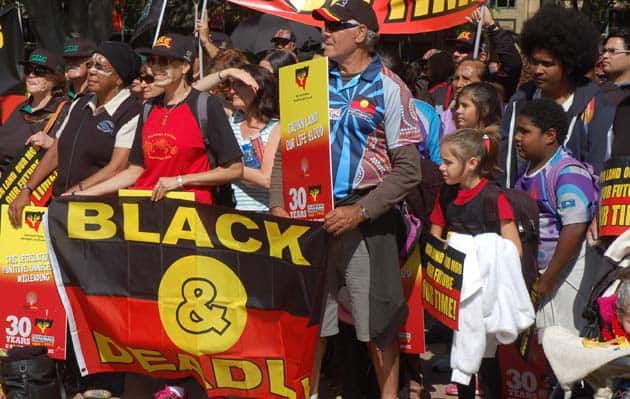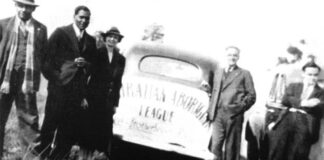The 20th anniversary of the Mabo case, where the High Court recognised Native Title, has been celebrated by the government and the media as an historic step for Aboriginal rights. But while Mabo formally rejected the legal doctrine of “terra nullius”, used to justify colonial dispossession, the High Court did not challenge the legitimacy of this dispossession.
It fact it ruled that Aboriginal ownership had been extinguished over the vast majority of the Australian continent—and that Aboriginal people were not entitled to any compensation for this.
Aboriginal activist Gary Foley calls the Mabo decision in 1992 and the Native Title Act that followed in 1993, “the greatest single act of dispossession since 1788”.
The Mabo decision simply provides the possibility of common law recognition of Aboriginal customary title, in the small number of places and circumstances where courts find this title has survived the onslaught of colonisation.
Aboriginal people must prove that they have maintained an ongoing connection to the land by continuing their traditional practices on it. But where the land was stolen and used for any other purpose—whether farming, mining or urban development—that stopped traditional practices, native title is considered extinguished.
The lands that have been given back are mostly in very remote areas in Australia and particularly on land unwanted by white settlements and industry. Only a small fraction of the Aboriginal population have any hope of gaining recognition of Native Title.
And even where it is recognised, Native Title does not provide rights to exclusively own or control the land.
Native Title is the weakest form of land tenure in the British common law system. Native Title holders can use land for certain purposes like camping, hunting and fishing. But they have no right to block commercial development. They cannot veto mining operations.
In June, the Arabana people had Native Title recognised over 68,000 square kilometres covering Lake Eyre and the Mound Springs conservation park. After an arduous 14 year claims process, they have gained, “unlimited access for hunting, camping, fishing and traditional ceremonies.” But they will have no power to stop the expansion of Roxby Downs into the largest uranium mine in the world. The mine will use 100,000 litres of water a minute, much of it pumped from Arabana country, devastating the fragile eco-system of the Mound Springs and surrounding areas.
The Native Title Act only stipulates that potential commercial developers must, “negotiate in good faith” with Native Title holders, “with a view to forming an agreement”. There is no requirement to actually enter into an agreement or even to pay mining royalties.
Michael Woodley, CEO of the Yindjibarndi Aboriginal Corporation, is currently fighting Andrew Forrest’s Fortescue Metals Group over their plans to push ahead with mining on Yindjibarndi Native Title lands. He says:
“Native Title legislation is really a discriminating process to legitimise the taking of Indigenous people’s land by government and industry… If we don’t do a deal, the company threatens us that they’re going to get the land anyway and we know they will. That puts poor people in a very compromising position.”
Protest actions or even media campaigns designed to bring pressure to stop the project are seen to be a breach of “good faith”—and can cost Native Title holders a seat at the negotiating table.
In this situation many Aboriginal Land Councils make the decision to take what they can get from negotiations with the mining companies, rather than oppose destructive mining operations which they have no legal power to stop.
For instance at James Price Point in WA, the Kimberley Land Council is supporting Woodside’s gas hub on pristine coastland, despite local elders opposing it because it would damage culturally significant sites. In exchange for a funding package from the mining company, the Land Council is therefore trying to undermine opposition to the development from local Aboriginal people and environment groups.
The process of claiming Native Title through the courts also places an enormous strain on Aboriginal communities.
As the Sydney Morning Herald reported about the claim of the Wongatha people in WA:
“After 12 years of litigation, 17,000 pages of transcripts, 100 days of hearings, 34 volumes of experts’ reports and 97 volumes of submissions, the claim was rejected in 2007, essentially on a technicality”.
Establishing an unbroken, customary connection to land in a hostile court-room means putting your identity on trial. This process can cause bitter divisions.
As a detailed report on the Victorian experience by Muriel Bamblett and other Aboriginal leaders says:
“What began with hope soon began to become a tool which fractured our tribes and communities in a way not seen before.
“Siblings, cousins, Uncles, Aunties—families began to be driven apart from each other. In some cases they would not even talk to each other.”
The process of fragmentation and compromise of the “Native Title” era is a far-cry from the nation-wide solidarity of the Aboriginal movement in the 1960s-80s that popularised the “land rights” slogan.
That movement demanded large grants of full freehold title to Aboriginal people as compensation for their systematic dispossession. This meant that all Aboriginal people had a stake in land rights—not just those who could prove an “ongoing connection”.
The movement gave birth to a national Aboriginal political consciousness and identity, and experiences of leadership and self-organisation that led to the establishment of vital community based organisations.
The Keating government’s Native Title Act has its roots in the betrayal of land rights by the Hawke Labor government. Hawke won the 1983 election promising to deliver national land rights legislation, but after pressure from state premiers and the mining lobby, he dropped it cold.
The Mabo ruling gave Keating an opportunity to displace the Aboriginal struggle for land from the political arena into the legal one.
Labor’s hypocrisy
Labor’s betrayal of Aboriginal people continues today. Labor Government Ministers displayed sickening hypocrisy at a Native Title conference held in Townsville to mark 20 years since Mabo.
Minister Macklin paid homage to historical figures of the Land Rights movement like Vincent Lingiari, who led the Wave Hill walk-off.
Never mind that Labor’s continued Intervention in the NT has compulsorily acquired the land Lingiari fought for at Daguragu.
Attorney General Nicola Roxon claimed Labor had been consistently “on the right side of history”, citing their support for Mabo and the Racial Discrimination Act (RDA). But Labor voted to suspend the RDA to help legislate the Intervention in 2007 and has intensified the policy since taking office.
Minister Macklin’s press release for Mabo day was titled: “Marking two decades of land rights and progress for Indigenous Australians”.
But both state and federal governments continue vicious attacks on Aboriginal land interests across the country, both to make way for destructive industry and to increase government control.
Traditional owners at Muckaty in the NT have taken the government to court over attempts to impose a nuclear waste dump on their land.
The Government and the Northern Land Council have argued the case should be struck out on the basis that Aboriginal owners effectively have no rights when it comes to nuclear waste.
Legislation introduced by the Howard government says that any nomination from a land council remains valid even if traditional owners never gave their consent. Labor’s new legislation maintains these provisions.
The NSW O’Farrell government has passed its own laws in March to allow uranium exploration in NSW to exclude provisions of the NSW Aboriginal Land Rights Act, ensuring Aboriginal people have no rights over uranium on Aboriginal land.
And as Mabo lawyer Bryan Keon-Cohn points out, the government still resists Native Title claims “tooth and nail” in the Federal Court—sometimes with legal bills that far exceed the value of the land.
Turning this around will require a head-on fight with Labor’s contemporary policies of dispossession—bringing the struggle out of the court-room and back onto the streets.
Paddy Gibson






